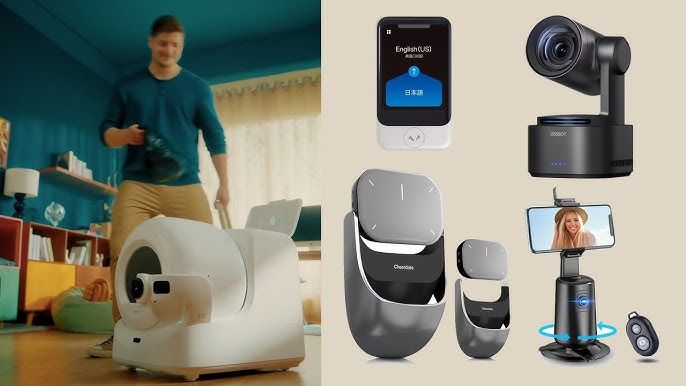

In recent years, artificial intelligence has transformed from science fiction into everyday reality. Let’s explore this topic in more detail with 2048 Game below. AI-powered gadgets are now accessible to consumers, offering smart features and capabilities that were once unimaginable. Let’s learn more about this topic below with 2048 Game.
Artificial intelligence has rapidly evolved from a niche technology into a ubiquitous presence in our daily lives. As AI algorithms have become more sophisticated and computing power has increased, tech companies have integrated AI capabilities into a wide range of consumer products. This shift has ushered in a new era of “smart” devices that can learn, adapt, and interact with users in increasingly natural and helpful ways.
The consumer AI market has exploded in recent years, with global spending on AI systems expected to reach $110 billion by 2024 according to IDC forecasts. Major tech giants like Apple, Google, Amazon, and Samsung have invested heavily in AI research and development, racing to bring innovative AI-powered products to market. At the same time, countless startups have emerged with creative applications of AI in consumer electronics.
For consumers, this AI revolution means access to devices and gadgets with remarkable capabilities – from voice assistants that can control your smart home to robot vacuums that map and navigate your house autonomously. AI enables more intuitive and personalized user experiences, automation of tedious tasks, and entirely new product categories that weren’t possible before.
As AI continues to advance at a rapid pace, we can expect consumer AI devices to become even more capable and seamlessly integrated into our lives. The gadgets available today offer an exciting glimpse into an AI-powered future that is already taking shape.
Read more: How AI Is Revolutionizing the Financial Industry
The smart home category has been at the forefront of bringing AI into consumers’ daily lives. Voice-controlled smart speakers and displays have become increasingly popular, acting as central hubs for controlling other smart home devices and accessing AI assistants.
Amazon’s Echo devices with Alexa and Google’s Nest products with Google Assistant have dominated this space. These AI assistants use natural language processing to understand voice commands and machine learning to improve their responses over time. They can answer questions, set reminders, control smart home devices, play music, and much more.
Beyond smart speakers, AI has been integrated into a wide range of home appliances and systems:
Smart thermostats like the Nest Learning Thermostat use AI to learn your temperature preferences and daily routines, automatically adjusting to save energy while keeping you comfortable.
AI-powered security cameras can distinguish between people, animals, and vehicles, sending intelligent alerts and reducing false alarms.
Robot vacuums like the Roomba j7+ use computer vision and AI to map your home, identify and avoid obstacles, and plan efficient cleaning routes.
Smart lighting systems leverage AI to learn your habits and automatically adjust brightness and color temperature throughout the day.
AI-enabled kitchen appliances like the June Oven use computer vision to identify foods and recommend optimal cooking settings.
As the number of smart home devices grows, AI plays a crucial role in creating a cohesive and intuitive ecosystem. Platforms like Apple HomeKit, Google Home, and Amazon Alexa use AI to enable seamless integration between different devices and brands. This allows for complex automations and scenes that can be triggered by voice commands, schedules, or other events.
For example, a “Good Morning” routine might gradually raise the smart blinds, adjust the thermostat, start the coffee maker, and brief you on your day’s schedule – all orchestrated by AI working across multiple devices. As more appliances and systems become connected, the potential for AI to optimize our home environments for comfort, efficiency, and convenience will only grow.
Smartphones have become powerful AI devices that we carry with us everywhere. The latest models from Apple, Google, and Samsung incorporate advanced AI capabilities that enhance everything from photography to battery life:
AI-powered computational photography enables features like portrait mode, night mode, and automatic scene optimization.
On-device machine learning models power features like face recognition, voice recognition, and predictive text input.
AI assistants like Siri, Google Assistant, and Bixby offer voice control and personalized recommendations.
Adaptive battery management uses AI to learn usage patterns and optimize power consumption.
Beyond smartphones, AI is transforming other personal electronics and wearables:
Smartwatches like the Apple Watch use AI for health monitoring, detecting irregular heart rhythms and potential falls.
AI-powered earbuds like the Sony WF-1000XM4 offer adaptive noise cancellation and automatic sound optimization.
Language translation devices like the Pocketalk S use AI for real-time speech translation in multiple languages.
Smart glasses like the Focals by North incorporate AI for contextual information display and voice control.
The health and fitness sector has seen particularly innovative applications of AI in wearable devices. Companies are leveraging AI to provide more accurate and personalized health insights:
The Oura Ring uses AI to analyze sleep patterns, activity levels, and physiological signals to provide a holistic view of health and readiness.
Withings’ Body Scan smart scale uses AI to assess nerve activity and heart health in addition to body composition.
The Whoop strap employs machine learning to optimize training and recovery for athletes based on continuous biometric data.
AI-powered fitness mirrors like the Tonal provide personalized strength training programs that adapt to your progress.
As AI algorithms improve and more data is collected, these devices will offer increasingly sophisticated health monitoring and personalized recommendations.
The automotive industry is undergoing a massive transformation driven by AI, with autonomous driving technology at the forefront. While fully self-driving cars are not yet available to consumers, many vehicles on the market today incorporate advanced AI-powered driver assistance features:
Tesla’s Autopilot system uses AI for adaptive cruise control, lane keeping, and automatic lane changes.
GM’s Super Cruise offers hands-free driving on compatible highways, using AI to monitor driver attention.
Nvidia’s DRIVE platform powers AI-based perception, planning, and mapping for autonomous vehicles.
Beyond driver assistance, AI is enhancing other aspects of the driving experience:
AI-powered voice assistants like Mercedes-Benz’s MBUX system offer natural language interaction for infotainment and vehicle controls.
Predictive maintenance systems use AI to analyze sensor data and anticipate potential issues before they occur.
AI-based route optimization can factor in real-time traffic data, weather conditions, and driver preferences.
In the broader mobility space, AI is powering new transportation solutions:
Electric scooter companies like Bird use AI for fleet management and optimizing scooter placement.
Ride-hailing services like Uber employ AI for route optimization, surge pricing, and matching drivers with riders.
AI-powered bike-sharing systems can predict demand and automatically rebalance bike distribution.
As AI continues to advance, we can expect to see more autonomous features in consumer vehicles and innovative mobility solutions that leverage the power of artificial intelligence.
Read more: Best Free AI Tools for Content Creators in 2025
Artificial intelligence is not only enhancing productivity and efficiency but also opening up new possibilities in entertainment and creative expression. Consumers now have access to AI-powered tools and devices that can generate, enhance, and personalize content in ways previously unimaginable.
In the realm of music, AI is transforming both creation and listening experiences:
Smart speakers like the Sonos One use AI for room calibration and sound optimization.
AI-powered music production tools like AIVA can compose original music in various styles.
Streaming services like Spotify use AI for personalized playlist generation and music recommendations.
In the visual arts and photography, AI is enabling new creative possibilities:
AI-powered photo editing apps like Prisma can transform photos into different artistic styles.
The Nvidia Canvas app uses AI to turn simple brushstrokes into photorealistic landscapes.
AI-enhanced cameras in smartphones can automatically apply optimal settings and post-processing for different scenes.
For writers and content creators, AI offers powerful assistive tools:
AI writing assistants like Grammarly use natural language processing to improve grammar, style, and clarity.
The Frase AI writing tool can generate outlines, suggest content ideas, and even draft articles based on prompts.
Language models like GPT-3 can generate human-like text for various applications, from creative writing to chatbots.
In gaming, AI is enhancing both gameplay and game development:
AI opponents in games like Chess and Go have reached superhuman levels of performance.
Procedural generation techniques use AI to create vast, unique game worlds and quests.
AI-powered characters in games like Shadow of Mordor adapt their behavior based on player actions.
As AI algorithms continue to improve, we can expect even more impressive and accessible creative tools that blur the lines between human and machine-generated content.